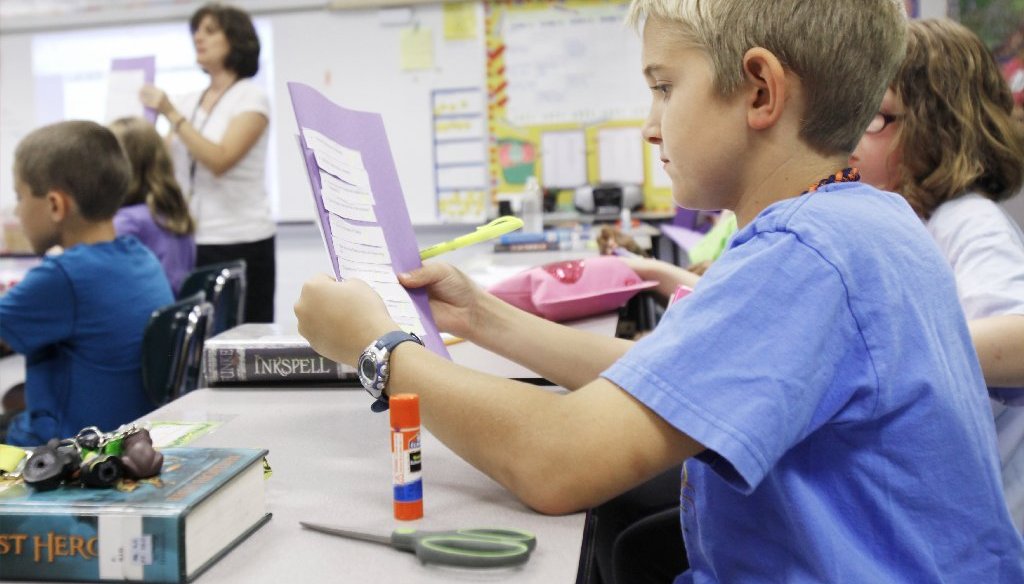

Our only agenda is to publish the truth so you can be an informed participant in democracy.
We need your help.


The governor's claim of record education funding is only valid by looking at raw dollars without adjusting for inflation. (Richmond Times-Dispatch photo)
Gov. Terry McAuliffe says his two-year state budget proposal would bestow unprecedented riches on Virginia’s public schools.
"Ladies and gentlemen, we are taking Virginia’s investment in public education to the highest level in the commonwealth’s history," he said on Dec. 17 as he introduced his budget to the General Assembly’s money committees.
"We’re not only setting a record in total state spending on education; we’re also pushing up our per-pupil contribution to $5,446 in 2018," McAuliffe added. "Again, this is the highest level of student support in our history."
We wondered whether the governor’s budget truly would be a record breaker for public schools, which suffered deep state cuts during the most recent recession and have struggled for years to regain those funds.
Raw dollars
Christina Nuckols, McAuliffe’s deputy press secretary, sent us a chart detailing total state aid for schools and per-pupil funding from 2001 through the current fiscal year, which ends June 30. The chart also carried forward those figures for each of the next two fiscal years in the governor’s biennial budget proposal.
In raw dollars, McAuliffe’s overall school budget would exceed the record $6.45 billion being spent during the current school year. lt would raise education spending to $6.54 billion next school year and to $6.82 billion during the 2017-18 term.
Many of those new dollars, if matched by local school systems, would fund about 2,500 new instructional jobs over the biennium and a 2 percent pay raise for teachers in July 2017.
In raw dollars, the governor’s spending plan also would break the state record of funding $5,248 per student - set during the 2008-09 school year in the last budget that was approved before the recession decimated revenues. McAuliffe’s budget would increase that level to $5,251 in 2016-17. The following school year, it would rise to $5,446.
What about inflation?
There’s a problem with comparing historic spending levels in terms of the raw money that was spent each year: A dollar spent today or in the future doesn’t buy as much as a buck spent in the past. So we took a more meaningful look at whether McAuliffe's plan, when adjusted for inflation, would remain the richest school budget in Virginia history.
The governor’s claim failed this test.
We adjusted each of the education budgets since 2001 to 2015 dollars, using inflation data published by the Bureau of Labor Statistics. Under these measurements, the high-water mark came in the 2008-09 school year, when the state spent an adjusted $6.96 billion on public education.
That figure exceeds the peak $6.83 billion expenditure - in raw dollars - in McAuliffe’s 2017-18 budget. And the governor’s outlay drops further in the rankings when it’s adjusted for inflation.
Financial forecasters generally are predicting annual 2 percent inflation rates for the next few years. If that proves accurate, then the adjusted dollars in McAuliffe’s peak education budget in 2017-18 would fall below the inflation-revised level of three state budgets that were in effect from July 2006 through June 2009.
We applied the same inflation adjustments to per-pupil spending, which is the gold standard in evaluating education budgets because it takes into account Virginia’s rising enrollments.
The glory years for state spending per student once again occurred during the budgets that were in effect from July 2006 to June 2009. Virginia, in adjusted 2015 dollars, spent $5,524 to $5,825 per pupil during those school years. McAuliffe’s peak proposal of $5,446 per student doesn’t rise to that level in raw dollars and falls further when adjusted for inflation.
Our ruling
"We are taking Virginia’s investment in public education to the highest level in the commonwealth’s history," McAuliffe said last month.
In raw dollars, the governor’s proposed budget would set state records for overall education spending and per-student outlays. But this is a misleading way of comparing spending levels, because raw dollars lose value over time.
A meaningful comparison of historic spending levels requires that the figures be adjusted for inflation. When that’s done, the governor’s education budget does not rise to the levels reached one to three years before the most recent recession.
So we rate the governor’s claim Mostly False.
Gov. Terry McAuliffe, Speech to the joint money committees, Dec. 17, 2015.
Email from Christina Nuckols, deputy communications director for McAuliffe, Jan. 4, 2016.
McAuliffe, Budget bill, submitted Dec. 17, 2015.
Statistica, "Projected annual inflation rate in the United States from 2008-2020," accessed Jan. 5, 2016.
Bureau of Labor Statistics, "Archived Consumer Price Index Detailed Report Information," 2000-2015, assessed Jan. 5, 2015.
Knoema, "U.S. Inflation Forecast 2015-2020," accessed Jan. 5, 2016.
Virginia Education Association, "Proposed Budget for K-12 Education for the 2016-18 Biennium," December 2015.
In a world of wild talk and fake news, help us stand up for the facts.
